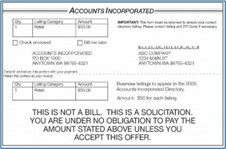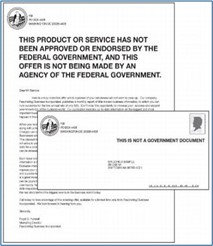Last February 7, a bill was introduced in the Illinois Senate by Senator Rachel Ventura (43rd). As synopsized at the time, SB 1440:
“Amends the Consumer Fraud and Deceptive Business Practices Act. Provides that it is an unlawful practice under the Act to knowingly mail or send a postcard or letter to a recipient in the State if the postcard or letter does not disclose or disclaim any and all affiliations or lack thereof. Provides that all disclosures and disclaimers appearing on a postcard or letter must be conspicuously located at the top of the postcard or letter, be easily readable in clear and unambiguous language, and be printed in at least 14-point bold-face font in a black-outlined box. Prohibits mail that requests that the recipient contact the sender by mail, telephone, email, website, or other prescribed means without specified disclosure requirements. Makes other changes.”
Over the spring, the bill gained cosponsors and moved through committees, finally passing in both houses on May 8. It was signed into law by the governor on June 9, to be effective January 1, 2024.
The text of the new public law [deletions stricken, additions underlined] states:
“Public Act103-0087
“Be it enacted by the People of the State of Illinois, represented in the General Assembly:
“Section 5. The Consumer Fraud and Deceptive Business Practices Act is amended by changing Section 2PP as follows:
“(815 ILCS 505/2PP)
“Sec. 2PP. Mail; disclosure.
(a) It is an unlawful practice under this Act to knowingly mail or send or cause to be mailed or sent a postcard or letter to a recipient in this State if:
(1) the postcard or letter contains a request that the recipient contact the sender by mail, telephone, email, website, or other prescribed means
call a telephone number; and(2) the postcard or letter is mailed or sent to induce the recipient to contact the sender by mail, telephone, email, website, or other prescribed means
call the telephone numberso that goods, services, or other merchandise, as defined in Section 1, may be offered for sale to the recipient; and(3) the postcard or letter does not disclose or disclaim that it is not a bill and that it is a solicitation for
thatgoods, services, or other merchandise, as defined in Section 1, that may be offered for sale if the recipient contacts the sender by mail, telephone, email, website, or any other prescribed meanscalls the telephone number; and.(4) the postcard or letter does not disclose or disclaim any and all affiliations or lack thereof.
(b) All disclosures and disclaimers appearing on a postcard or letter must be conspicuously located at the top of the postcard or letter, be easily readable in clear and unambiguous language, and be printed in at least 14-point bold-face font in a black-outlined box.”
Background provided by the Association of National Advertisers suggests a clear motivation for the measure: “There have been notable problems reported by consumers who receive fake warranty offers for car repairs and home warranties that seem to be real invoices despite no true affiliation with car dealers or otherwise. A typical example is an offer for a car warranty that costs the car owner a warranty fee to avoid new car repairs. Buried in very small font, the car warranty company states it is not affiliated with the car dealership. Consumers then purchase the warranty under a mistaken belief it is from their own car dealer and learn they have been mislead.”
Statute
Federal law (39 USC 3001 and 3005), reflected in DMM 601.9.1 and 601.9.2, already restricts deceptive mailings, such as solicitations in the guise of a bill or messages implying a connection to the federal government.


Included in those standards are requirements for conspicuous markings and endorsements on the related mailpieces, as illustrated in DMM Exhibits 601.9.1.2 and 601.9.2.3(b).
In effect, therefore, the Illinois statute seems to be substantively similar to existing federal law and postal regulations, at least in purpose if not in exact requirements.
The USPS
In response to our question, the Postal Service’s General Counsel provided the agency’s views on the Illinois law:
“… The Postal Service has not taken a position on state laws purporting to place restrictions on mailability that extend beyond the provisions of federal law and our own regulations, and we do not believe that we would have a legal basis to claim that a law like this is invalid under the Supremacy Clause.
“With that said, any mailer who would be subject to the law may of course make its own judgment about any legal challenges it may mount or any legal remedies it may have. And it is also conceivable that a state could enact a law so restrictive that we could colorably claim that it frustrates our ability to provide universal postal services in a self-sustaining manner. But this law does not appear to go that far, although we will certainly keep an eye out for how this and other laws play out in practice. …”
With all of that in mind, if commercial mailers sending advertisements into the state are compliant with the applicable postal and statutory requirements they could also be compliant with the Illinois law. Just the same, it might be prudent to get competent legal advice to be certain.


